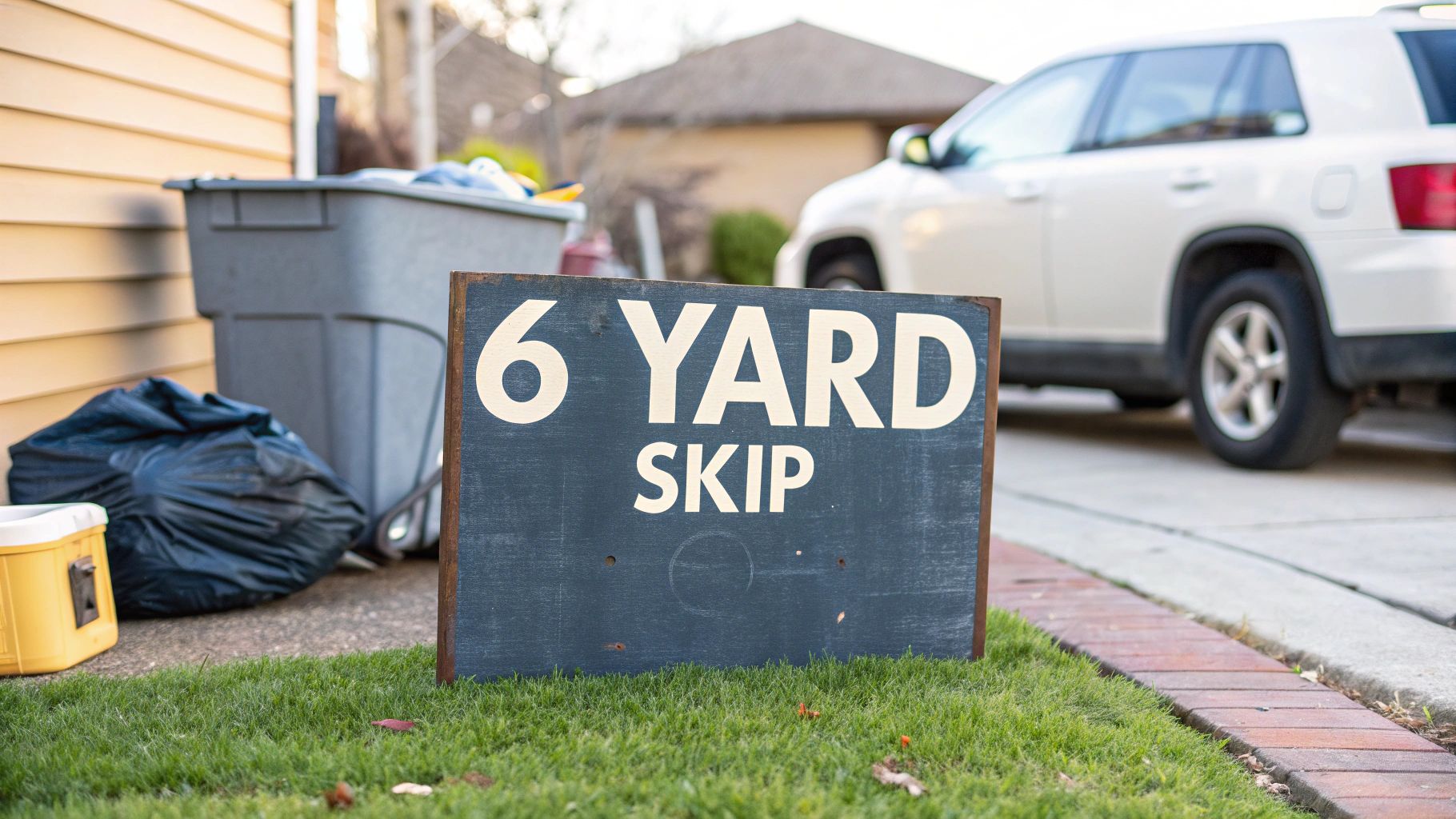what can t you put in a skip: UK rules explained
what can t you put in a skip: UK rules explained
Before you dive in and start filling that skip, it’s really important to know that it’s not a magic box for absolutely everything. You can't just toss any old thing in there.
Some of the big no-nos include hazardous materials like asbestos and leftover paint tins, electrical goods such as TVs and fridges, and other tricky items like tyres and batteries. More recently, things like old sofas and armchairs have been added to this list. Getting your head around these rules from the get-go is the key to a smooth, hassle-free clear-out.
The Essential Rules for Skip Hire
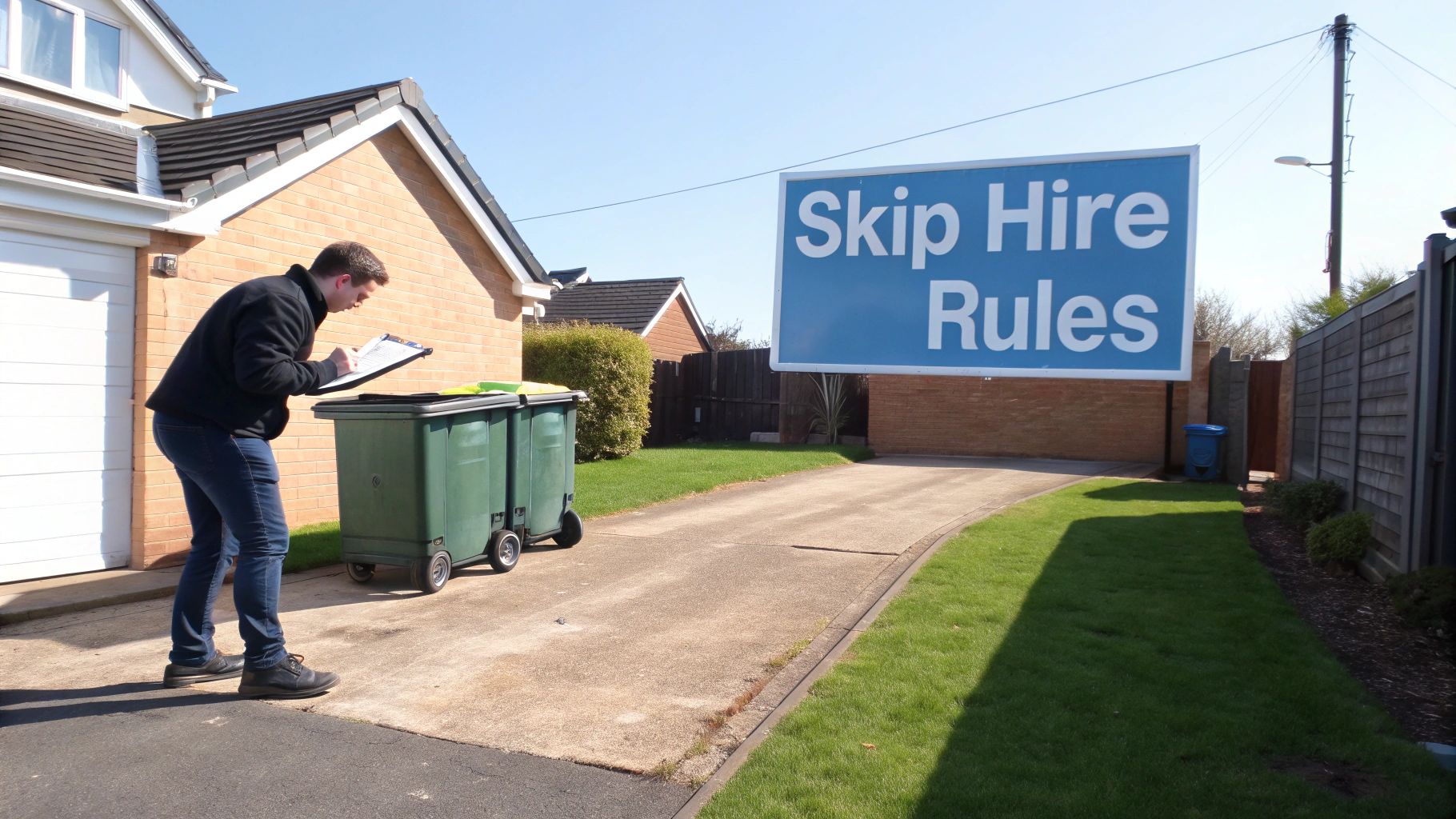
Hiring a skip can feel like the perfect solution for a big declutter, giving you one simple place to get rid of huge amounts of rubbish. But behind that convenience, there’s a strict set of regulations designed to keep everyone safe – from the public to the environment, and even the waste handlers themselves.
It helps to think of a skip as a collection point for general, non-hazardous waste. It’s ideal for things like wood, soil, bricks, rubble, and old non-electrical fittings. The minute you throw in a banned item, however, you run the risk of contaminating the entire load. This could lead to the skip company refusing to collect it, leaving you with your original mess plus the threat of a hefty fine. This is especially crucial to remember for big jobs that require proper waste disposal during a house move.
Why Are There Restrictions?
These rules aren't just there to make your life difficult; they're based on serious safety concerns and legal requirements. Many of the items on the banned list contain nasty substances that can seep into the ground, poison our waterways, or release toxic fumes if they aren't disposed of properly.
For example:
- Hazardous materials: Things like asbestos or chemical solvents are genuinely dangerous. They pose severe health risks and need to be handled by licensed specialists.
- Electricals (WEEE): All your old electronics, from kettles to computers, contain components like lead and mercury. Under the Waste Electrical and Electronic Equipment (WEEE) regulations, these must be recycled through specific, controlled channels.
- Bulky items: Tyres are a real headache for landfill sites – they don’t biodegrade and are a serious fire risk. Meanwhile, soft furnishings like sofas are now known to contain chemicals called Persistent Organic Pollutants (POPs), which also require special disposal.
Key Takeaway: The whole point of skip restrictions is segregation. By keeping hazardous, electrical, and other regulated items separate from your general waste, you’re ensuring everything gets processed safely and legally. It’s the best way to prevent environmental damage and avoid getting into trouble.
Quick Guide to Prohibited Skip Items
To make it easier, we've put together a quick-glance table. It covers the most common items you can't put in a skip, why they're banned, and what you should do with them instead.
| Prohibited Item | Primary Reason for Ban | Recommended Disposal Route |
|---|---|---|
| Asbestos | Highly toxic fibres; poses severe health risks | Specialist licensed asbestos removal service |
| Electricals (TVs, Fridges) | WEEE regulations; contain hazardous components | Council recycling centre; retailer take-back scheme |
| Paints & Solvents | Hazardous liquids; risk of soil/water contamination | Local council hazardous waste collection |
| Upholstered Furniture | Contains Persistent Organic Pollutants (POPs) | Council bulky waste collection; specialist disposal |
| Tyres | Non-biodegradable; fire risk at landfill | Specialist tyre recycling facility or local garage |
| Batteries & Gas Bottles | Fire and explosion risk; contain corrosive chemicals | Local recycling points; supplier return schemes |
Always double-check with your local council or the skip hire company if you're unsure about a specific item. It’s always better to ask first than to sort out a contaminated skip later
Navigating Hazardous Waste Restrictions
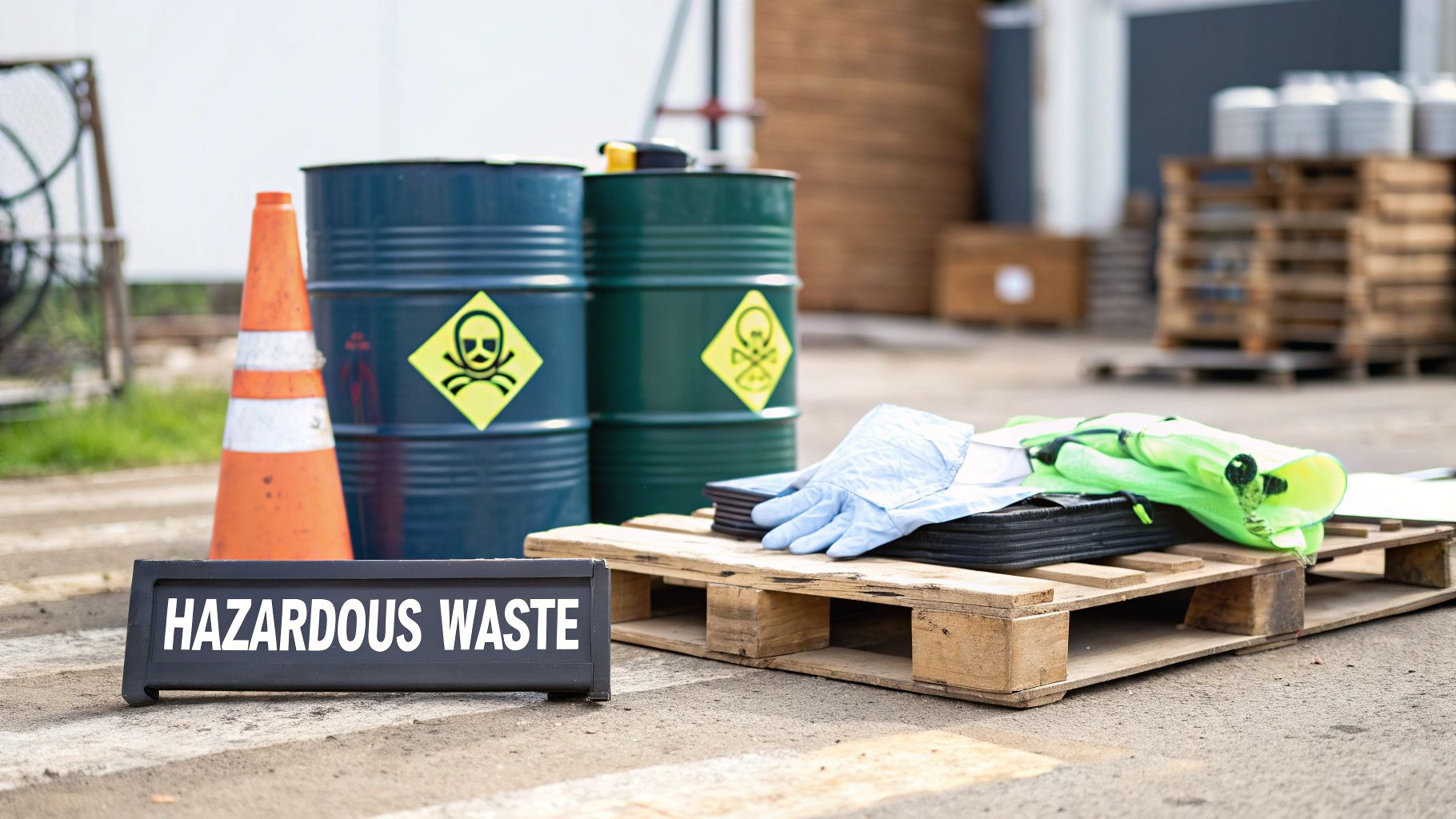
When you're trying to figure out what can’t you put in a skip, hazardous waste is without a doubt the most important category to get your head around. It's best to think of these items as being in a strictly controlled 'danger zone' that has no place in your general waste.
These materials aren't banned just to make your life difficult. Far from it. They're prohibited because they pose a very real threat to people's health, the local environment, and even the safety of the teams and machinery at waste processing facilities.
Tossing hazardous materials into a general waste skip is a bit like pouring poison into a river. The contamination doesn't just stay in one place; it spreads, causing damage that goes far beyond the skip itself. The laws around waste disposal are designed specifically to stop this from happening, making sure these dangerous substances are handled only by specialists who know how to neutralise the threat they pose.
Unpacking Specific Hazardous Bans
Every single skip hire company will have a universal list of prohibited items, banned because of their dangerous properties. Knowing what’s on this list is the first step to a safe and legally compliant clear-out.
Here are some of the usual suspects you can't put in a skip:
- Liquid Chemicals: This is a broad category covering things like leftover paint, solvents, oils, and potent chemical cleaners. These liquids can easily leak from the skip, seeping into the ground and contaminating the soil and groundwater for many years to come.
- Gas Cylinders: It doesn't matter if they seem empty. Gas cylinders can hold residual pressurised gas, creating a serious explosion risk when they get crushed or moved around at waste processing plants.
- All Battery Types: From the small AAAs in your TV remote to hefty car batteries, these items are filled with corrosive acids and toxic heavy metals like lead and mercury. If they get damaged in a skip, they can leak these nasty chemicals or even spark a fire.
Important Insight: The golden rule behind all these restrictions is risk mitigation. Every banned item has the potential to kick off a harmful chain reaction, whether it’s injuring a waste operative with an unexpected chemical reaction or causing long-term pollution. Keeping this stuff separate is your best line of defence.
The Asbestos Exception
Asbestos is in a completely different league when it comes to hazardous materials. It is strictly forbidden from being placed in any standard skip because of the devastating health risks it carries.
When materials containing asbestos are broken up, they release microscopic fibres into the air. If someone inhales these fibres, they can lead to fatal diseases like lung cancer and asbestosis, often with symptoms not appearing until decades after the exposure.
The Control of Asbestos Regulations 2012 lays down very strict legal rules for its removal and disposal. This work can only be done by licensed professionals. Trying to sidestep these rules can lead to massive fines and cause serious environmental damage.
The legal and safety consequences of getting this wrong are huge. For a closer look at the rules that govern this area, you can learn more by reading our detailed guide on hazardous waste disposal regulations. Getting to grips with identifying and managing these materials isn’t just about following the rules—it’s about protecting people and the planet.
Why Your Old Sofa Can't Go in a Skip
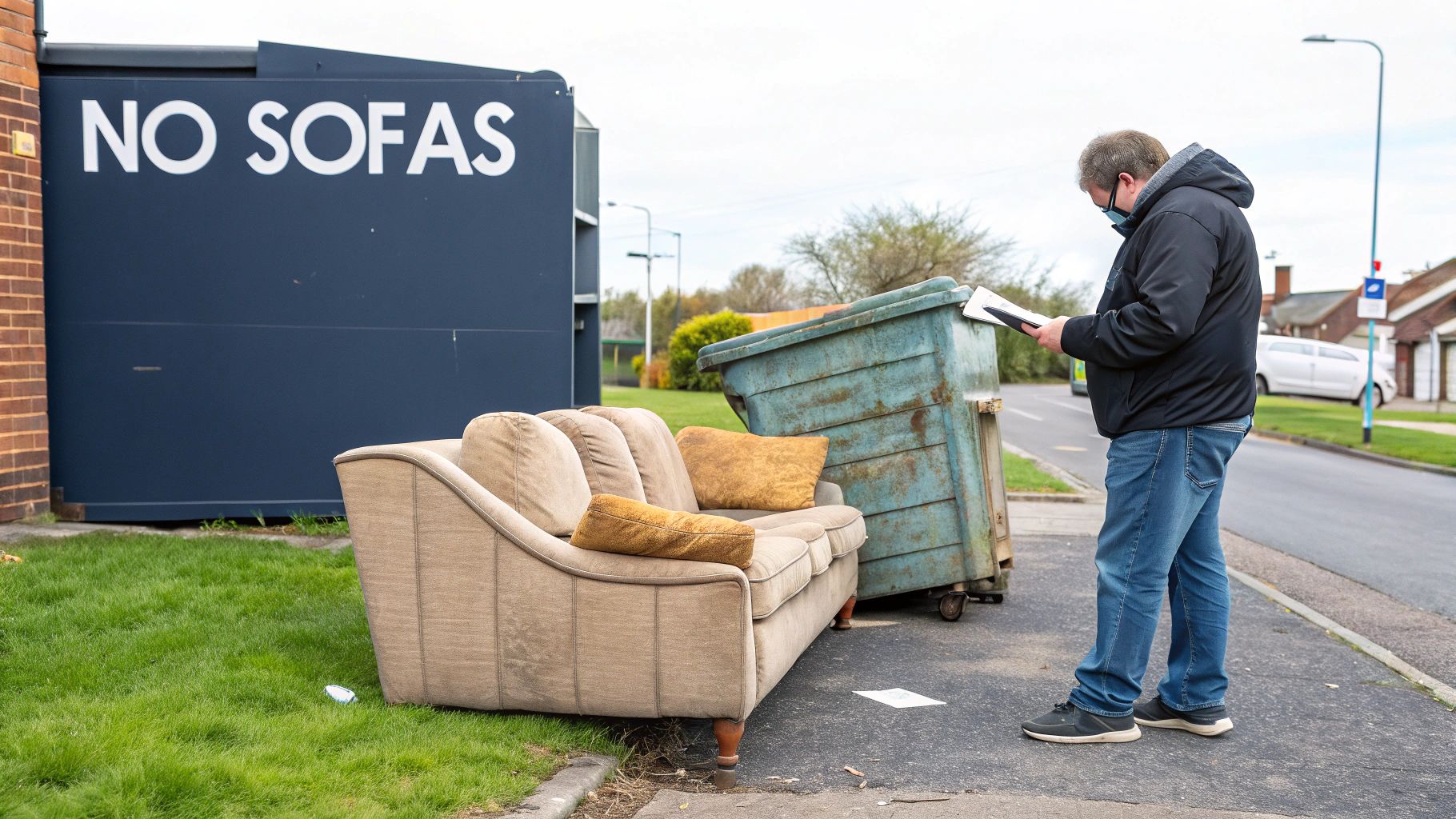
It seems perfectly logical, doesn't it? An old, bulky sofa is exactly the sort of thing you’d hire a skip for during a big clear-out. For years, that’s exactly what people did.
But things have changed. Recent shifts in environmental law mean your comfy old armchair or three-piece suite is no longer welcome in a general waste skip.
This isn't a case of skip companies suddenly becoming difficult; it's a nationwide rule that has reclassified certain types of furniture as hazardous waste. The change catches a lot of people by surprise and is all down to some hidden chemicals that were once common in manufacturing.
Since January 2023, UK skip hire companies have had to follow new guidance from the Environment Agency. This means banning upholstered furniture like sofas, sofa beds, and armchairs from all general skips. The reason? They contain materials now classified as holding Persistent Organic Pollutants (POPs) – nasty substances that have long-term toxic effects and just don't break down.
The legislation was brought in to tackle the harmful impact of the textile and foam components in our old furniture, which can release these pollutants when they end up in a landfill.
Understanding Persistent Organic Pollutants (POPs)
So, what on earth are POPs, and why are they lurking in your sofa?
Think of them as chemical ‘ghosts’. They are substances that don’t break down easily and can hang around in the environment for decades, causing harm long after the item they were part of is gone. Many older upholstered items were treated with flame retardants and other chemicals that, we now know, contain these POPs.
When these items get buried in a landfill and start to degrade, these tiny but toxic particles can leach into the soil and seep into our water systems. They can also be released into the atmosphere if the waste is burned improperly.
Crucial Insight: The ban is a vital preventative measure. By treating upholstered furniture as hazardous waste, it ensures these items go to specialist facilities equipped to handle and destroy POPs safely, stopping them from ever entering the wider environment.
This is a big change, but it’s important to remember it doesn't mean all your old furniture is now banned from skips.
What Furniture Can and Cannot Go in a Skip
Thankfully, the rules are quite specific, which helps clear up any confusion. The ban applies almost exclusively to what’s called 'domestic seating' – basically, anything upholstered you’d sit on at home.
To make it crystal clear, here’s a quick breakdown:
- Banned Items (Contain POPs): Sofas, sofa beds, armchairs, kitchen and dining room chairs with cushioned seats, upholstered office chairs, and even bean bags.
- Acceptable Items (No POPs): Wooden tables, solid wood bed frames, wardrobes, cabinets, and hard plastic chairs that don't have any textile covering.
If you’re getting rid of a mix of items, understanding whether you can put furniture in a skip is crucial to avoid your collection being rejected. The golden rule is to always keep your waste separate and, if you're in any doubt, have a quick chat with your skip provider first.
Commonly Banned Household and Site Items
Beyond the obvious hazards, you might be surprised to learn that a whole host of everyday items from your home or building site can't be tossed into a skip. These rules aren't there to be difficult; they exist for very specific safety and legal reasons, making sure that anything with complex or harmful bits inside is handled the right way.
Getting your head around these less obvious restrictions is the key to a hassle-free clear-out. Items like batteries, gas cylinders, liquid chemicals, and medical waste are banned from UK skips to prevent some pretty serious environmental damage and safety risks. Keeping them separate isn’t just a good idea – it’s the law.
Electrical Waste (WEEE)
Got anything with a plug or a battery? That's covered by the Waste Electrical and Electronic Equipment (WEEE) regulations. Just think of WEEE as a special recycling club for all your electronic gear.
Things like TVs, computer monitors, fridges, and even smaller gadgets like kettles or old mobile phones contain components that can be really nasty if they end up in a landfill. For instance, old-school screens have mercury in them, and fridges contain coolant gases that are terrible for the ozone layer. WEEE rules make sure these items are taken apart safely, with the dangerous parts removed and any valuable materials recovered. That's exactly why they can't just be chucked in a skip—they have their own dedicated recycling journey to go on.
Key Insight: Tossing WEEE items into a skip contaminates the entire load. The waste transfer station is legally obligated to separate them, which could land you with some hefty extra charges or even result in the whole skip being sent back to you.
Other Commonly Prohibited Site Items
Several other common items are regularly turned away by skip hire companies because of the risks they pose during transport and at the disposal facility. Knowing what they are beforehand can save you a real headache on collection day.
Here's a quick checklist of other materials you can't put in your skip:
- Tyres: Tyres are built to last, which means they're not biodegradable and take up a huge amount of precious landfill space. More importantly, they're a massive fire risk at waste facilities, and when they burn, they produce thick, toxic smoke.
- Fluorescent Tubes: These long, energy-saving light bulbs contain a small amount of mercury powder. If one smashes in a skip, that toxic substance can easily escape into the atmosphere.
- Medical Waste: Anything from a medical practice – needles, dressings, old medication – is classed as clinical waste. It needs specialist disposal to prevent the risk of spreading infection.
- Plasterboard: While it might not seem hazardous, plasterboard has to be kept separate from general waste. When it gets wet and starts to break down with other rubbish, it can release hydrogen sulphide – a smelly, toxic, and flammable gas. For a full rundown, check out our guide on how to dispose of plasterboard the right way.
Right, so you've got a pile of stuff that the skip hire company won't take. What now? Knowing what you can't put in a skip is one thing, but figuring out how to get rid of it legally and safely is the next big step. The good news is, there are proper channels for everything from that ancient fridge in the garage to a half-used tin of paint.

Think of your general waste skip as being for the simple, straightforward rubbish. Anything on that banned list needs a specialist touch. You wouldn't send a delicate glass vase through the post in a flimsy paper envelope, would you? It's the same principle here. Hazardous or regulated items can't just be chucked into the general waste stream; they need their own secure "delivery service" to make sure they get where they're going without causing any harm.
Following the proper disposal routes isn't just about ticking a legal box. It's about protecting our environment from nasty substances, preventing contamination, and making sure that any valuable materials can be recovered and put back to good use.
Your Local Household Waste Recycling Centre
For most of us, the first port of call for these tricky items is the local Household Waste Recycling Centre (HWRC) – what many of us just call "the tip." These places are brilliant, as they're set up specifically to handle a whole range of materials that skips can't take.
At a typical HWRC, you’ll find dedicated bays and containers for specific types of waste, such as:
- Electricals (WEEE): Separate skips for big appliances like fridges and washing machines, plus cages for smaller things like TVs, microwaves, and old computers.
- Hazardous Household Waste: You'll usually find special collection points for paints, engine oil, garden chemicals, and all types of batteries.
- Bulky Items: Designated areas for mattresses, carpets, and sometimes even those tricky upholstered sofas that contain POPs.
- Other Restricted Materials: Bins for old tyres, gas bottles, and fluorescent light tubes.
A quick tip before you load up the car: always check your local council's website. Some centres require you to book a time slot, and there might be limits on how much you can bring in one go. It pays to check first.
This infographic gives you a quick visual guide on where to take common items that can't go in your skip.
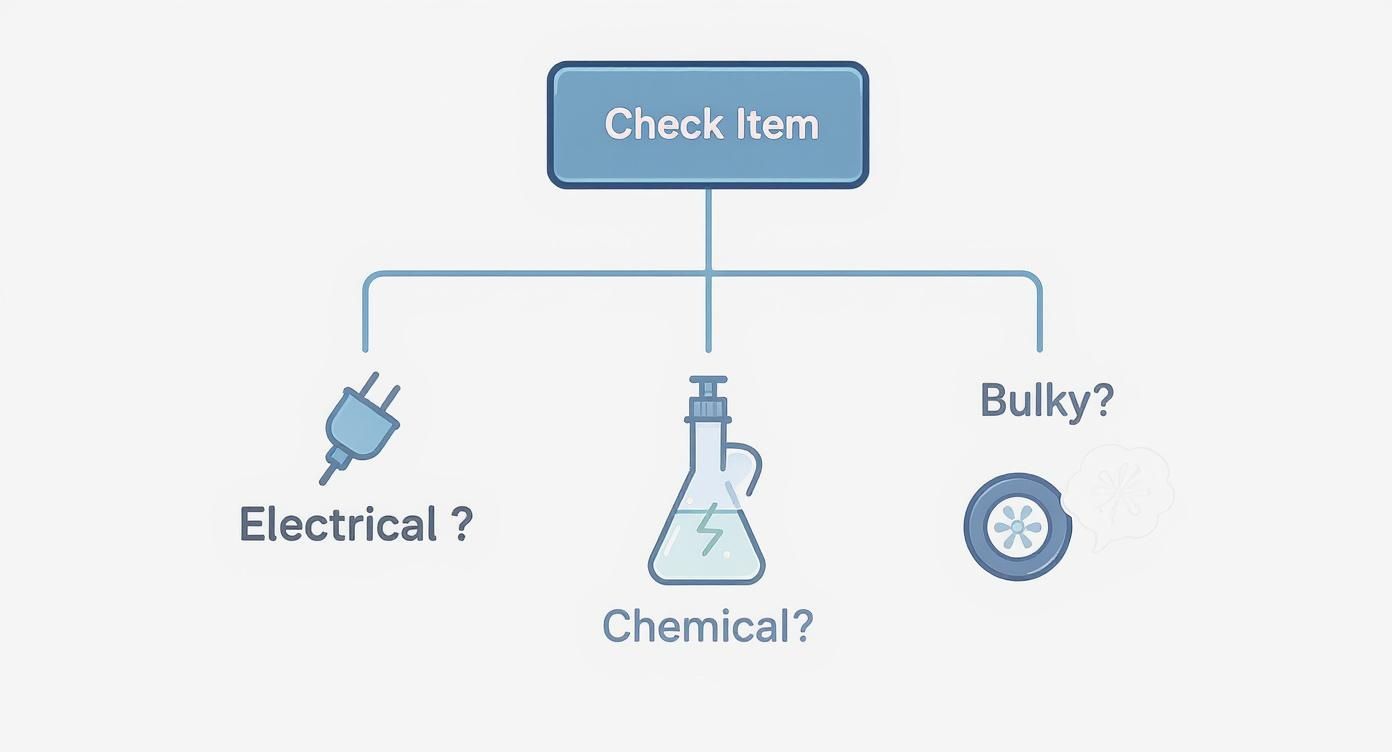
As you can see, things like electronics, chemicals, and certain large items need a different disposal journey than your general rubbish.
Specialist Collection Services and Retailer Schemes
Let's be honest, sometimes a trip to the tip just isn't practical, especially if you're dealing with something really big or genuinely hazardous. This is where specialist services come into their own.
For seriously dangerous materials like asbestos, calling in a licensed specialist isn't just a good idea—it's a legal must. These pros are trained to handle and remove hazardous waste safely, and they'll give you the proper paperwork to prove you've disposed of it correctly.
Many councils also offer a bulky waste collection service for a small fee, which is perfect for items like old sofas and armchairs that contain POPs. Also, remember that when you buy a new large electrical appliance, the retailer is often legally obliged to offer a take-back service for your old one. For other electronics that can’t go in a skip, like laptops or small kitchen gadgets, you can usually find local electronics recycling options through dedicated schemes. These services make being responsible incredibly easy.
To make things even clearer, here's a quick table comparing the best disposal routes for common prohibited items.
Disposal Alternatives for Banned Skip Items
| Item Type | Primary Disposal Option | Secondary Option | Key Consideration |
|---|---|---|---|
| Asbestos | Licensed Specialist Removal | N/A | Do not handle yourself. This is a legal requirement for safety. |
| Large Appliances (Fridges) | HWRC (Tip) | Retailer Take-Back Scheme | Ensure the HWRC accepts refrigeration units. |
| Small Electronics (WEEE) | HWRC (Tip) | Local Electronics Recycling | Many supermarkets have collection points for small items. |
| Paints & Solvents | HWRC (Hazardous Waste Section) | Community Repaint Schemes | Only take to designated hazardous waste points; never pour down the drain. |
| Plasterboard | HWRC (Designated Bin) | Specialist Skip Bag | Must be kept separate from other waste to avoid contamination. |
| Tyres | HWRC or Tyre Fitter | N/A | Most tyre fitters will dispose of your old ones for a small fee. |
| Gas Canisters | HWRC or Original Supplier | N/A | Never puncture or put in general waste due to explosion risk. |
| Mattresses | HWRC (Bulky Waste) | Council Bulky Collection | Some councils charge for bulky collections, so check their website first. |
This table should help you quickly identify the right path for your waste, ensuring you stay compliant and environmentally friendly. When in doubt, your local council's website is always the best source of information.
Common Skip Hire Questions Answered
Trying to figure out the rules of skip hire can feel like a bit of a minefield, especially when you're in the middle of a big project. You just want the rubbish gone, but getting it wrong can cause delays and unexpected costs.
To help you out, we’ve put together answers to some of the most common questions we get about what you can and can’t put in a skip. These clear, straightforward answers should give you the confidence to manage your waste correctly right from the start.
Can Plasterboard Go in a Skip?
This is easily one of the most frequent questions we hear, and the short answer is no, you can't mix plasterboard with your other general waste in a skip. It might seem harmless, but when plasterboard gets wet and starts to break down with other rubbish, it can release hydrogen sulphide gas. This gas has a foul smell and is also toxic and flammable.
Because of this chemical reaction, waste regulations are very strict: plasterboard must always be kept separate. You've got two main ways to handle it:
- A dedicated plasterboard-only skip: If you have a large amount to get rid of, this is the most straightforward and efficient way to do it.
- Specialist skip bags: For smaller jobs, many skip companies offer special bags designed just for plasterboard.
What Happens If I Put Banned Items in My Skip?
Putting prohibited items in your skip is a gamble you really don't want to take. Skip companies are legally responsible for making sure the waste they collect is compliant, so they take this very seriously. The consequences can vary, but none of them are good news for you.
If the driver spots a banned item when they come to collect, they'll probably refuse to take the skip until you've removed it. If the item is hidden and only found back at the waste transfer station, you can expect extra charges to cover the cost of specialist, safe removal. In the worst-case scenario, the entire contaminated skip could be returned to your property for you to sort out yourself.
Expert Advice: Honesty is always the best policy. Be upfront with your skip hire company about everything you're throwing out. A quick phone call to double-check is far less hassle than dealing with a rejected skip and potential fines down the line.
Do I Need a Permit for My Skip on the Road?
Yes. If any part of the skip is going to be placed on public land—that means the road, a pavement, or even a grass verge—you will need a skip permit from your local council. This isn't just red tape; it's a legal requirement to ensure the skip is placed safely and doesn't block traffic or cause a hazard for pedestrians.
Your skip hire company will almost always sort out the permit application for you, but they will pass the cost on to you. The price and how much notice you need to give can vary massively from one council to another, so it's always smart to plan ahead.
Of course, if you have a private driveway or garden where the skip can sit entirely on your own property, you won’t need a permit at all. This is the ideal situation, as it can save you both time and money.
At The Waste Group, we’re all about making waste management simple and stress-free. Whether it’s giving you clear guidance on what can go in your skip or arranging council permits for you, we handle all the details. For reliable, next-day skip hire across Dorset, get your instant quote online today at https://www.thewastegroup.co.uk.
